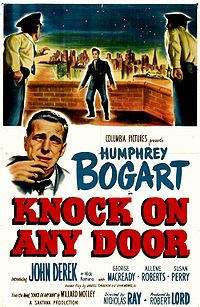
KNOCK ON ANY DOOR
US, 1948, 100 minutes, Black and white.
Humphrey Bogart, John Derek, George Macready.
Directed by Nicholas Ray.
There has been a long tradition of Hollywood films about slums, gangs and delinquency. Humphrey Bogart appeared in a number of them during the 1930s including Dead End. This is a post-war version of the same theme with Bogart playing an attorney who came from the slums but who has a softer heart under his tough exterior and tries to defend the young men. A young John Derek is a ruthless killer from the slums. George Macready is the district attorney.
The theme of this story was taken up in the 1959 film Go Naked in the World with Ernest Borgnine and Gina Lollobrigida.
Nicholas Ray made a number of striking films in the 1940s and 1950s: They Live By Night, In a Lonely Place, On Dangerous Ground, The Lusty Men and Johnny Guitar. With the coming of Cinemascope his films became longer and larger, culminating in the 1961 King of Kings and Fifty-five Days at Peking. Several films were made about him including a documentary by Tim Robbins.
1.The film as a social document? Was it true that if you knocked on any door you would find people like Nick Romano?
2.The structure of the film: the court case and the flashbacks? Did audiences expect Nick Romano to be innocent or guilty? How did this affect viewing of the film and sympathy with Andrew Morton’s story? The effect of finding that Romano was guilty? What effect did it have on all that Morton had said?
3.How did the film establish a parallel between Andrew Morton and Nick Romano? Valid for giving insight into the slum situation?
4.Andrew Morton as a person? Why had he got out of the slums? Insight into why he did have to go to work for the slum boys? The effect on their criminal careers? How did he sacrifice his own personal ambitions in working for the Romanos? Why did Romano still lie to him? The effect of his finding out that Nick had lied?
5.Did the film show convincingly the poverty of the Romanos and others like them in Chicago? The crowded home, the language barrier, the religion barrier? The need to prove oneself in tough ways in the slums? The effect of Romano’s death on the family? The blame attributed to Morton – and Morton’s blaming the whole of society and its systems? Was it inevitable that Nick should be as he was?
6.What motivated Nick during his career of petty crime? The effect of reform school? Was it too cruel? Could anything else have been done? Was he bad through and through or could he have been redeemed? His friends: Sunshine and the others? How did they lead him on? Or did he lead them? Their lying for him?
7.Could Emma have changed Nick? Why did he love her? How did she actually change him? The possibilities for change when Andrew took him to dinner? Why could he not hold down his jobs? Was Emma’s suicide credible? Its effect on Nick?
8.How interesting was the court case? The tactics used by both sides? The implication of the prosecution in their forming a case against Nick? How did this influence audience sympathies? How did this add to the shock that Nick was guilty?
9.The value of Andrew Morton’s final switch about the state of Chicago and the slums? Too nobly done? Sentimental? Artificial? Or was it still moving? Do these comments have continual validity?
10.The strength of the film as a social thriller? What value do films like this have? In changing people? In influencing their opinions?